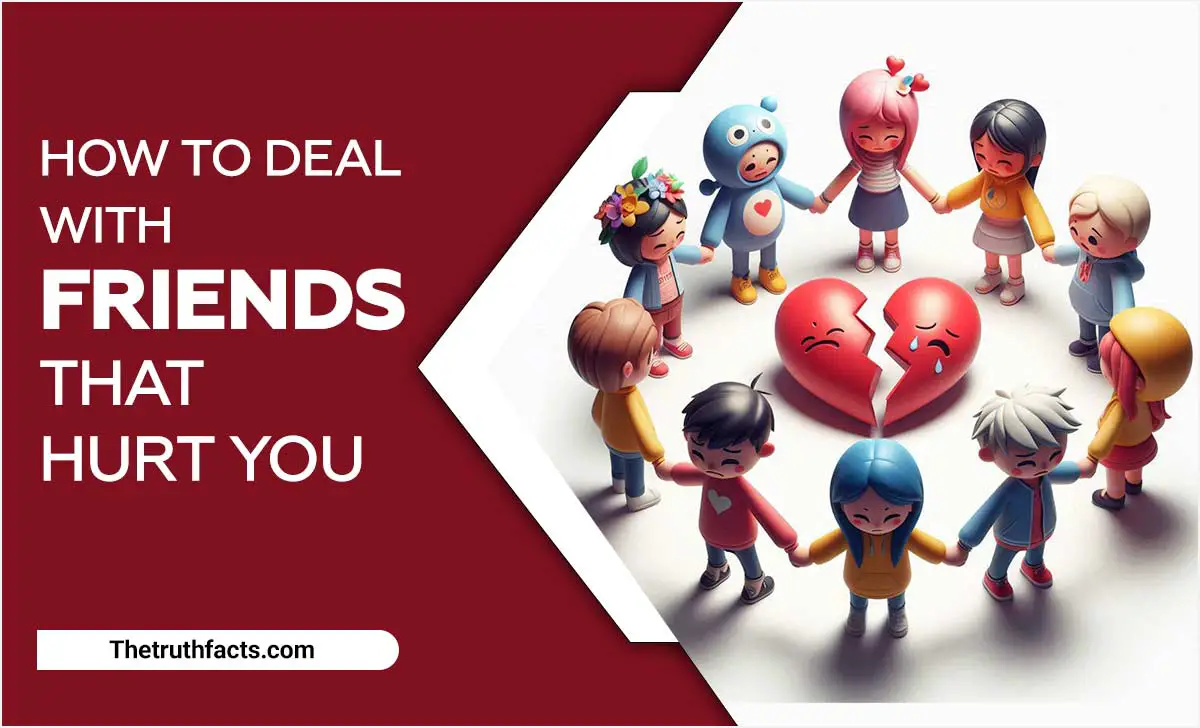Sometimes friends can do things that hurt us unintentionally. They might say things that make us feel embarrassed or unsupported. Or they may do things that make us feel like we’re not good enough.
No one deserves to feel like this, and it’s tough to deal with when it happens. Here are some tips on how to deal with friends that hurt us.

Controlling Your Reaction

It’s hard when friends hurt us, but it’s even harder when we can’t stop the hurt from spreading. The temptation to lash out in anger is strong, but it’s important to remember that the other person might not understand what they’re doing.
Try to take control of your reaction and remember that the other person may not be aware of the damage they’re causing. Letting the hurt linger can only worsen things, so getting over it as quickly as possible is important. Friends that hurt us deserve our patience and understanding so that we can move on from the incident and heal.
1.Remain Composed
When a loved one hurts you, it’s natural to feel angry and sad. However, your best bet is to remain composed at all times. This will help keep the anger hidden and prevent them from seeing your tears.
Try not to raise your voice in anger – this only makes matters worse. Instead, try speaking calmly and sensibly about what has happened so that the friendship can end on good terms instead of bitterness or resentment.
Let them know how you feel without attacking them or making any accusations; simply express how hurt and betrayed you are.
2.Walk Away From The Situation
In difficult or emotionally charged situations, it’s best to step away from the fray. This will help you maintain some level of control and prevent yourself from getting too invested in a situation that may not have good endings.
Try not to let anyone push you around – this usually only leads to further drama and hurt feelings. Be strong enough to stand up for yourself and walk away if necessary. In the long run, doing this will be better for both of you.
3.Use Calming Methods
When friends hurt us, keeping our emotions in check can be difficult. This is especially the case when the friend in question doesn’t seem to care about how we’re feeling.
There are numerous calming methods that can help us deal with such a tough situation. Journaling, deep breathing exercises, etcetera all work extremely well and should always be on our list of go-to options.
It’s important to have someone close by who will support and encourage us during this time – without them, it might be hard to get through these tough times.
Addressing Your Friend’s Behavior

It can be really hard to deal with friends that hurt your feelings. But it’s important to talk about the issue. It can take time, but eventually, you’ll be able to resolve the issue.
The best way to start is by acknowledging that you’re feeling hurt and upset. Try not to get angry or upset – this will only worsen the situation. Instead, try to find a solution that you can agree on. Maybe, you can break up with them. If not, try and find a way to patch things up. Remember, talking is the best way to solve problems.
1.Address The Behavior Directly
When something upsetting happens, it’s natural to lash out in various ways. One way is by speaking with friends and family about the incident. This can help you get clarification on what happened and why it upset you so much. Avoid taking things out on your friend – this will only result in them feeling even worse.
Instead, try communicating in a calm and rational manner so that both of you can come to a resolution together. Suppose your friend still refuses to understand or behaves aggressively towards you. In that case, it might be best for either of you to seek professional help from a mental health specialist or counselor who can provide better support and guidance.
2.Recognize Patterns Of Hurtful Behavior
It can be difficult to identify when our friend is hurting us, but it’s important to try. Once we have a good idea of what triggers hurtful behavior, we can start addressing it.
We can take some steps to minimize the pain – apologize, stay calm and listen carefully. Remember that friends come and go, but our relationships with them are priceless. So don’t hesitate to reach out for help in times of distress – your friend will appreciate it.
3.Confront Repeated Behavior
When it comes to dealing with hurtful friends, it is important to start by confronting their behavior head-on. If confrontation doesn’t work, the next step would be making a friendship change – removing them from your social circles. If that too fails, then you should talk to a professional about how best to handle such situations.
4.Let Your Friend Respond
When something goes wrong in our relationships, we often tend to lash out at one another. However, this isn’t the best way to go about things. In fact, it can be quite damaging both mentally and emotionally.
So before you do anything – including reacting negatively – think about what would be the best thing for you and your friend.
Address the issue head-on and listen while attempting to understand why they did what they did (even if you still don’t agree with them). If that doesn’t work, then maybe mediation or seeking professional help will do better justice than continuing on a negative path.
5.Remain Compassionate
It can be tough when friends hurt you, but it’s important to remember that we’re all human. Try to remain compassionate and talk about the situation honestly.
Moving on together is always best for everyone involved. Don’t bottle up your feelings – they will only get worse in the long run. Take some time off to reflect and heal yourself – this process won’t happen overnight, but with patience and good judgment, you’ll eventually feel better again.
6.Decide If The Friendship Can Stand
Ending a friendship can be difficult, but it is usually best for both parties involved. Sometimes, there are just too many clashes between the two friends that it becomes too much to bear.It’s important to remember that ending a friendship is not always an easy decision – especially if one of the friends has been close to you for a long time.
Once you’ve made up your mind, try and communicate this clearly and openly to your friend, so they don’t get hurt in any way. Be understanding and compassionate towards them; after all, they might also be suffering from their own feelings of sadness or betrayal.
Moving Past Your Hurt Feelings

It can be hard to move on from a difficult friendship, but it’s important to try. Sometimes, the best way to do this is to talk about your feelings. This way, your friend will know that the situation is serious and you’re hoping for a resolution.
Remember that forgiveness takes time, so don’t expect it overnight. In the meantime, there are many ways to deal with hurt feelings.
Some people find comfort in talking about their feelings, while others may find solace in writing or taking walks. Be sure to communicate with your friend about how you’re feeling – that way. They’ll know how serious the situation is. And finally, remember that forgiveness is a process, not an event.
1.Reflect On The Situation
When something goes wrong, it’s important to step back and take a moment to understand what happened. After all, this is the first step in finding a solution.
Once you have figured that out, you need to assess your emotions and why you feel them so strongly. This will help guide your course of action moving forward. It is also important to be gentle on yourself during this time – after all, self-care is key for healing any wounds inflicted by life experiences or traumas.
2.Choose To Let Go Of Hurt Feelings
Hurt feelings are a natural response to an event that has affected us negatively. However, it is important to recognize that these feelings are normal and acceptable.
Most of the time, hurt feelings will stay with us for some time; however, we can choose to let them go in order to move on. This might not be easy at first, but with practice, it becomes easier and more manageable.
3.Stop Seeing Yourself As A Victim
Sometimes relationships end, and this can be a difficult process. However, it’s important to remember that you are not alone in this. Many people go through the same thing every day. Instead of viewing yourself as a victim, take some time for yourself and clear your head before attempting to rebuild the relationship.
Remember that you deserve to have good relationships – they are essential for overall mental health and well-being. Finally, don’t hesitate to reach out to friends or family members who can provide support during these times.
4.Forgive And Move On
It is important to forgive yourself for going through the hurt. This will help you move on from experience in a healthy way. Let go of the anger and resentment you feel towards them. It won’t do any good to keep those feelings bottled up inside, as this only leads to bitterness and frustration.
Instead, focus on your future and what you can do to move on from this difficult time. Maybe consider seeking counseling or therapy if needed – it could be very helpful in healing your heartache.
Conclusion
Friends are important, and sometimes they can do things that hurt your feelings. It’s important to control your reaction to these situations, as it will help you feel more in control.
When addressing your friend’s behavior, be sure to be respectful and understanding. This will help to build a stronger friendship relationship.
Frequently Asked Questions

I’m a writer and blogger who loves to talk about entertainment, culture, and relationships. I love to share my thoughts and insights on these topics, and I’m always looking for new ways to engage with my readers. I’m also a big fan of learning new things, so I’m always exploring new areas of interest.
